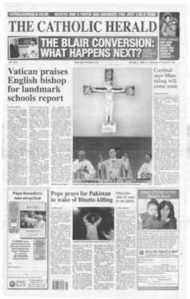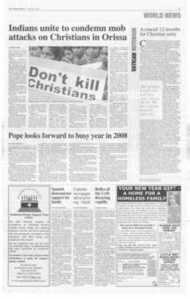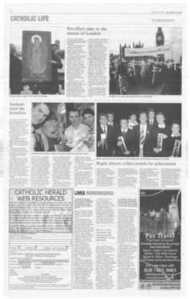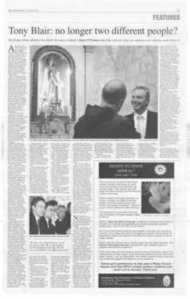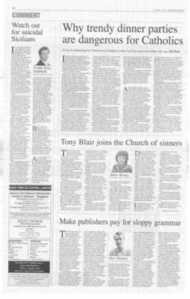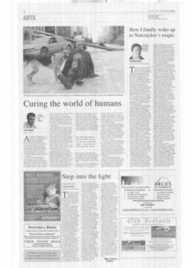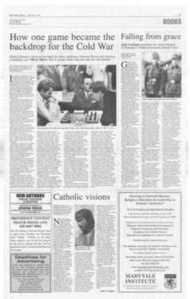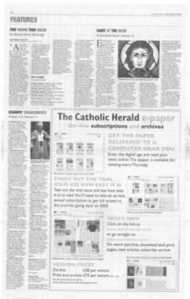Page 9, 4th January 2008
Page 9

Report an error
Noticed an error on this page?If you've noticed an error in this article please click here to report it.
Tags
Share
Related articles
A Baffling Bid For John Paul's Support In Iraq
Blair
Tony Blair Speaks Of His Passionate Belief In Faith
It Is Not Christian To Oppose The Reception Of Tony Blair...
A Distasteful Compromise That Simply Has To Work
Tony Blair: no longer two different people?
The former Prime Minister has finally become a Catholic. Garry O'Connor asks if he will now clear up confusion over what he really believes Agravelly, harsh Ulster voice came over the phone-in line on BBC Radio Belfast. "If Mr Blair converts to Catholicism, a million Catholics will leave the Church tomorrow!" This was only few months ago, and I was being interviewed about my book The Darlings of Downing Street, mainly centred on the religious faith of the Blairs, and how Tony and Cherie reflected one another as mirror images in all aspects of their lives.
Blair was about to step down. As a final theatrical flourish of his world stage tour before leaving Downing Street on June 27, he took Cherie with him to Rome for an audience with Pope Benedict XVI. It was largely believed he would convert then, there having been much speculation over the years about when he would "come out" as a papist, with all the opposition and outcry that might follow. But then, as earlier, courage appeared to have failed him, in spite of taking with him a gift of a book about Cardinal Newman's cbnversion to Catholicism.
His main fear was of mainstream voters not approving of his faith. Only last month a close friend and mentor, John Burton, reported that Blair had told him there was "no point" now in becoming a Catholic — this in response to the news in a Catholic weekly macrazine that Cardinal Cormac Murphy—O'Connor would soon, in a private chapel at Westminster Cathedral. be iFreceiving him into the Church. And now it has I happened. I happened. r Blair had always had plans to convert. It first r. won him approval in the eyes of Cherie Booth, and it indicates the depth of her influence over him from the very beginning. Cherie Ir • once said: "Not all the people I went out with were particularly religious, but it was one of the things that Tony and I had in common from the beginning."
Blair's parents did not appear to have any of the religious zeal of Cherie's Liverpool Catholic family. Although he went to Durham Cathedral Chorister School and was a communicant Anglican, he showed little enthusiasm for religion until after his father's stroke and, later, his mother's death.
Blair must have continually felt during those early years envy for Cherie's cradle Catholicism. Whenever possible, he joined her in Catholic Communion — yet checked by the fear it might compromise his ambition and aware how unpopular it could make him. Cherie could receive the Eucharist, soaring above him in faith and practice while he illicitly practised the central sacrament of a faith he had not publicly joined. He wanted to become one, to merge with his Catholic wife; Cherie was his bridge to Catholicism.
Surprisingly, however, Cherie consented to a Church of England wedding at the chapel of St John's College, Oxford, where Blair had studied. Anthony Philips, the chaplain, commented that both were "so devout in their Christianity". To marry in a Protestant church Cherie had to obtain permission from her bishop, otherwise in canon law the marriage would be invalid and she would be banned from receiving the sacraments.
Concerns over, or at least attention on, Blair's potential conversion to Catholicism reached a peak in 1998. His election in 1997 had added a new twist to the tale of British suspicion, even hostility, towards Catholicism. Before he became Prime Minister he took Catholic Communion at St Joan of Arc Church in Islington, north London. "I look back on our time in north London as among the happiest in our family life and I look forward to getting back to that one day in the future," Cherie said. "People didn't know that he wasn't a Catholic," said Fr Michael Seed. Cardinal Hume, CormacO'Connor's precursor at Westminster, clashed notably with Blair over his taking Communion. In a Vatican directive of 1996 the Pope had tightened the practice of refusing Communion to nonCatholics, and accordingly Cardinal Hume had written to Blair asking him not to receive Communion any more.
Canon Timothy Russ, the local priest near Chequers when Blair was Prime Minister, was questioned constantly by Blair about the Catholic faith. Canon Russ had the impression Blair was lonely. Canon Russ would tell Blair that he was wrong in doing this and doing that. He once suggested, with Cherie present, that they ought to go to Blackpool instead of Tuscany for their holidays, but Cherie "would not have any of that". He felt that Tony and Cherie were far too interested in wealth and believed that success first and foremost meant making money.
One day he turned to Canon Russ, furious in the argument they were having, "How much do you make?" he asked the priest.
"Five hundred pounds a year."
"Five hundred what?" stuttered Blair, aghast.
There was a furore in the press criticising Blair's appointment of Ruth Kelly as Education Secretary, because she was known to be a member of Opus Dei. Blair asked Canon Russ: "What is Opus Dei?"
"A rather strict organisation of Me Church." the priest told him, and then added: "General Franco had 11 members of Opus Dei in his government."
"I've only got one — what's wrong with me?" Blair replied.
He expressed his strong desire when he stepped down to become a deacon — and a Catholic deacon at that, confirming the often speculated belief that he would convert to Catholicism sometime in the future. "Would this be possible?" he questioned Canon Russ, who told him: "It usually takes two or three years."
"The fact that I'm PM," replied Blair, "could this make a difference?"
So will the fast-tracking to deaconhood happen now, and how long will it take? Canon Russ believed hierarchy and procedures fascinate Blair: "He has a lot of potential for good," he added. "He is still looking for the meaning in his life." But he was, the priest emphasised, "two different people".
Blair's 2002 decision to go to war, fully endorsed in public by Cherie, brought the question of Blair's Catholic faith again into the public arena. In early 2003, on the eve of the Iraq war, they travelled to Rome to meet the Pope. This gave Blair the opportunity to put his case for a war and seek the Pontiff's counsel, even his endorsement. As he was to say on the Michael Parkinson show in March 2006, specifically about his decision to invade Iraq: "If you have faith you realise that judgment is made by God."
How Blair thought he might convince John Paul that his case for war was just beggars credibility. But he argued hard. In the 20minute audience the Pontiff pointed out the terrible consequences. if he took that step. He took no notice, because the decision to invade had already been taken. When I asked her, Cherie said John Paul had told him: "Ultimately, it is up to you to decide what to do." This was, according to Cherie, the exact response. In England upon his return, Blair told a friend something different. What John Paul said to him, not once but three times he revealed, was: "I am very glad this is not my decision."
One of the worst consequences of the war has been the persecution of Catholics in Iraq, who have fled the country in hundreds of thousands.
NowBlair is a Catholic will he be implementing the philosophy that gained him power in the first place: working from within for change?
Cherie's philosophy, like his, was that you remain inside; you influence and ultimately control by being part of something — such as the Labour Party, and (highly unsuccessfully, as it proved) the Bush administration — not from outside.
The privileges seized from her involvement with the Catholic Church expanded towards the end of their time in Downing Street. The family no longer went to public Mass at Westminster Cathedral, but had asked Fr Seed to come round to celebrate it in the top-floor sitting room of No 11.
Bush had given the Blairs a present of coasters with his photographic image on them, which Tony and Cherie, proud of the gift, placed on the John Lewis coffee table in the No 11 sitting room. Imagine. The Blair family used to gather round the coffee table on sofas in rapt and sincere devotion to receive the sacrament from the chalice.
The priest who'd come to say Mass had slipped into 10 Downing Street by the back door. He had to move the coffee table coasters. Bush's presidential gift to the Prime Minister, with the face and that smirking grin, to one side.
Blair had always dismissed as "tedious" the question of whether he would finally convert. He had attended Mass and received Communion for 25 years or more, anyway, so was "a de facto Catholic", according to Fr Seed (which had made his advice to the Queen on such matters as the appointment of bishops technically illegal).
The unacknowledged Catholicism had served him well politically. According to a MORI poll after the 2005 general election, Labour won the popular vote by three percentage points. Had no Catholics voted, the Tories would have secured a knife-edge 35 per cent to 34 per cent lead in the popular vote. The Catholic vote was higher than at the 1997 election.
So why this particular moment for conversion? Before now Blair never felt he could afford it. During his premiership Establishment sensitivity over the Northern Ireland question made him fear electoral disaster, while secular malevolence in the media toward Christianity, often using Blair as a bad example, reached its height. But conversion is a momentous event, and brooks no delay in one who is deeply sincere. But, as ever, Mr Blair has, even with God, made Him wait upon his convenience.
Many Catholics will no doubt react, as the Ulsterman did, with fury. They will argue that Mr Blair should not be accepted into the Church without a full and public rebuttal and repudiation of his views and support of embryonic stemcell research, abortion. civil partnerships, cloning, and penitence overall for the moral morass -and decline of the family that has resulted in his embrace of the celebrity culture in all its forms and aspects.
One highly influential Catholic, Professor Jack Scarisbrick, says: 'Ile has done more to deChristianise this country than any other Prime Minister."
Blair's embrace of the Catholic faith marks a significant development in the strange concoction of religion and politics, one that has the driven the two main players in this drama of power for a quarter of a century.
Garry O'Connor is the author of Universal Father: A life of Pope John Paul II and also The Darlings of Downing Street: the psychosexual drama of power
blog comments powered by Disqus


